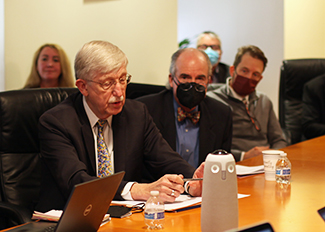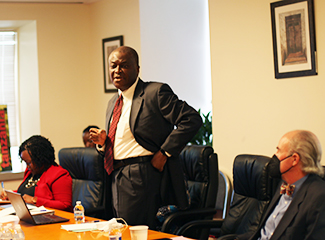NIH, HHS discuss health systems strengthening, sickle cell disease at US-Africa summit
January/ February 2023 | Volume 22 Number 1
 Photo credit: Fogarty International Center
Francis Collins (left) former director of NIH, now at NHGRI, spoke about the importance of addressing current patient needs and conducting bold research at a roundtable on global partnerships for sickle cell disease (SCD) held at the Embassy of the Republic of Tanzania in December.
Photo credit: Fogarty International Center
Francis Collins (left) former director of NIH, now at NHGRI, spoke about the importance of addressing current patient needs and conducting bold research at a roundtable on global partnerships for sickle cell disease (SCD) held at the Embassy of the Republic of Tanzania in December.
HHS hosted a roundtable on health equity and health systems strengthening with delegates from 12 African countries plus the African Union as part of the
2022 U.S.-Africa Leaders Summit which took place in Washington, DC, in mid-December. Fogarty Acting Director Peter Kilmarx represented NIH and focused on the importance of health research as a key contributor to the health infrastructure and the broader medical workforce. "The delegates were particularly energized around the research discussion and spoke favorably about research to address health challenges and develop evidence-based policies," noted Kilmarx. Jennifer Troyer of the National Human Genome Research Institute (NHGRI), Francis Collins, former NIH Director now at NHGRI, and representatives from the National Cancer Institute (NCI) and the National Institute of Mental Health (NIMH) also attended. Delegates agreed on "the need for local capacity, new government commitment and investment in research as retention factors for top national talent," Kilmarx added.
Building on
the first summit, which took place in 2014, the second U.S.-Africa Leaders Summit covered topics from economic engagement to food security and health cooperation over three days. Among the several side events that took place was a roundtable on global partnerships for sickle cell disease (SCD) held at the Embassy of the Republic of Tanzania. Kilmarx and Collins, along with George Mensah from the National Heart, Lung, and Blood Institute (NHLBI), participated.
 Photo credit: Fogarty International Center George Mensah (standing) of NHLBI discussed the Sickle Pan-African Research Consortium (SPARCO), which was launched via an NHLBI grant in 2017. Mensah gave an overview of the
Sickle Pan-African Research Consortium (SPARCO), which was launched via an NHLBI grant in 2017. He also addressed how local partners and governments need to think about the sustainability of programs like SPARCO, after initial funding runs out. Julie Makani, principal investigator (PI) on SPARCO, emphasized how basic science research goes hand in hand with implementation science. "Mechanisms of disease cannot be answered by shipping samples outside of Africa," she said while adding that doing research into things like the genomics of SCD must hold equal importance as providing access to curative therapies.
Photo credit: Fogarty International Center George Mensah (standing) of NHLBI discussed the Sickle Pan-African Research Consortium (SPARCO), which was launched via an NHLBI grant in 2017. Mensah gave an overview of the
Sickle Pan-African Research Consortium (SPARCO), which was launched via an NHLBI grant in 2017. He also addressed how local partners and governments need to think about the sustainability of programs like SPARCO, after initial funding runs out. Julie Makani, principal investigator (PI) on SPARCO, emphasized how basic science research goes hand in hand with implementation science. "Mechanisms of disease cannot be answered by shipping samples outside of Africa," she said while adding that doing research into things like the genomics of SCD must hold equal importance as providing access to curative therapies.
Dr. Collins echoed this sentiment, "We have to do both–address current patient needs and conduct bold research." An outpatient procedure to treat SCD not requiring an advanced degree to perform and done without expensive equipment is "the dream," Collins said. However, a reframing from "donorship" to "ownership" is required with African institutions and governments ensuring the sustainability of such initiatives. Collins referred to the
Human Heredity and Health in Africa (H3Africa) and
Harnessing Data Science for Health Discovery and Innovation in Africa (DS-I Africa) programs—in which grants went directly to African organizations resulting in new research networks, South-South collaboration, and diminished brain drain—as a model. At both the SCD event and the Ministerial Roundtable, Collins championed a concept developed by African scientists and H3Africa PIs Christian Happi, Ambroise Wonkam, and Nicola Mulder for African genomics centers of excellence throughout the continent, each focused on their particular interest whether it be pandemic preparedness, infectious diseases, or noncommunicable diseases like SCD. There are economic arguments in addition to ones for public health for such a venture, Collins said.
On the main agenda for the Summit was the “Partnering for Sustainable Health Cooperation" forum, hosted by Loyce Pace, Assistant Secretary for Global Affairs at HHS which included remarks by HHS Secretary Xavier Becerra, President Yoweri Museveni of Uganda, President Mokgweetsi Masisi of Botswana—who called out
former Fogarty Fellow Sikhulile Moyo's discovery of the omicron variant of COVID-19—and CDC Director Rachel Walensky. The forum also included two panels which addressed investment in public health initiatives and the expansion and strengthening of Africa's health care workforce, including the Biden-Harris Administration's
Global Health Worker Initiative and USAID's
partnerships to accelerate primary health care in African nations.
More Information
Updaed February 13, 2023
To view Adobe PDF files,
download current, free accessible plug-ins from Adobe's website.
Related World Regions / Countries
Related Global Health Research Topics